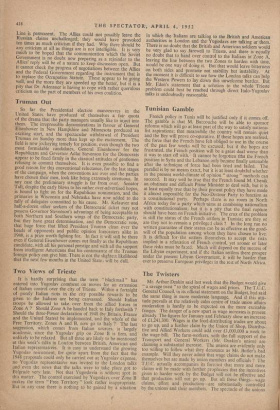Truman Out
So far the Presidential election manoeuvres in the United States have produced of themselves a fair quota of the drama that the party managers usually like to inject into them. The irrepressible demonstrations in favour of General Eisenhower in New Hampshire and Minnesota produced an exciting start, and the spectacular withdrawal of President Truman on Sunday more than kept up the excitement. The field is now jockeying tensely for position, even though the two most formidable candidates, General Eisenhower for the Republicans and Governor Adlai Stevenson for the Democrats appear to be fixed firmly in the classical attitudes of gentlemen refusing to commit themselves. It is even possible to find a good reason for this conventional reluctance, for the last stages of the campaign, when the conventions are over and the parties have chosen their men, look like being extremely strenuous. In any case the preliminary struggle is far from over. Senator Taft, despite the early blows to his rather over-advertised hopes, is bound to fight on for the Republican nomination, and the primaries in Wisconsin and Nebraska have now added to the tally of delegates committed to his cause. Mr. Kefauver and half-a-dozen other seekers of the Democratic ticket may not possess Governor Stevenson's advantage of being acceptable to both Northern and Southern wings of the Democratic party, but they have great determination, and the Democratic vote, that huge force that lifted President Truman clean over the heads of opponents and public opinion forecasters alike in 1948, is a prize worth fighting for. In fact it will still be there even if General. Eisenhower comes out finally as the Republican candidate, with all his personal prestige and with all the support from intelligent Americans that his continuance of the Truman foreign policy can give him. There is not the slightest likelihood that the next few months in the United States will be dull. •


























































 Previous page
Previous page